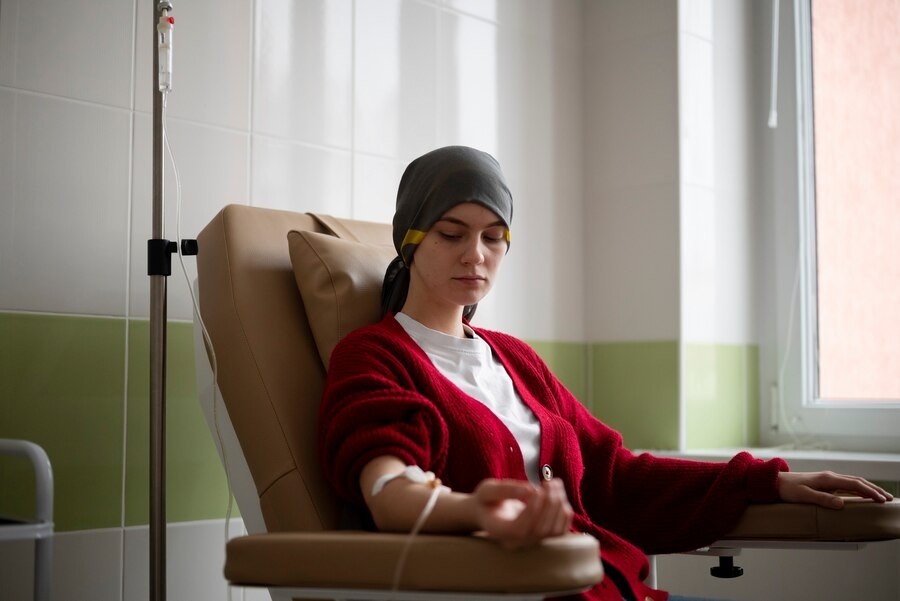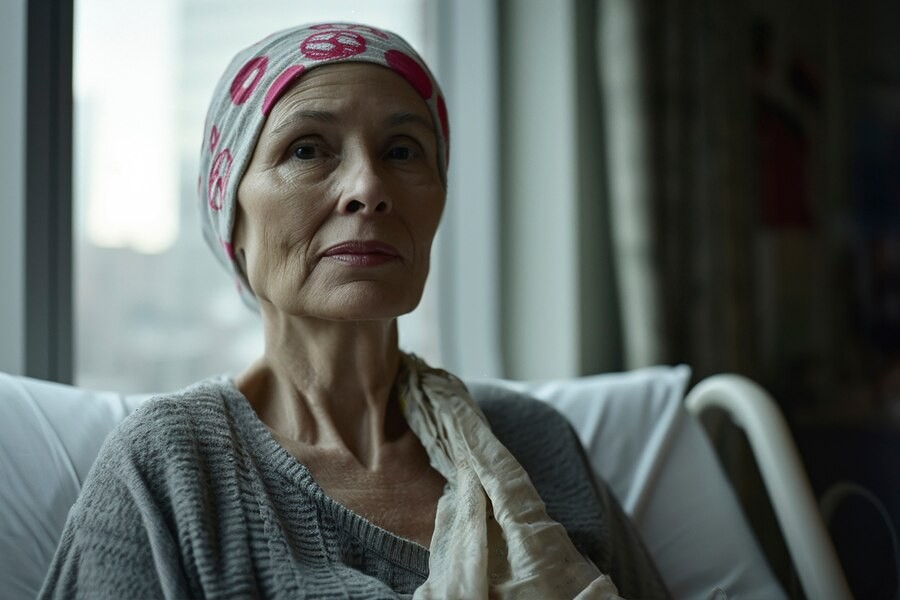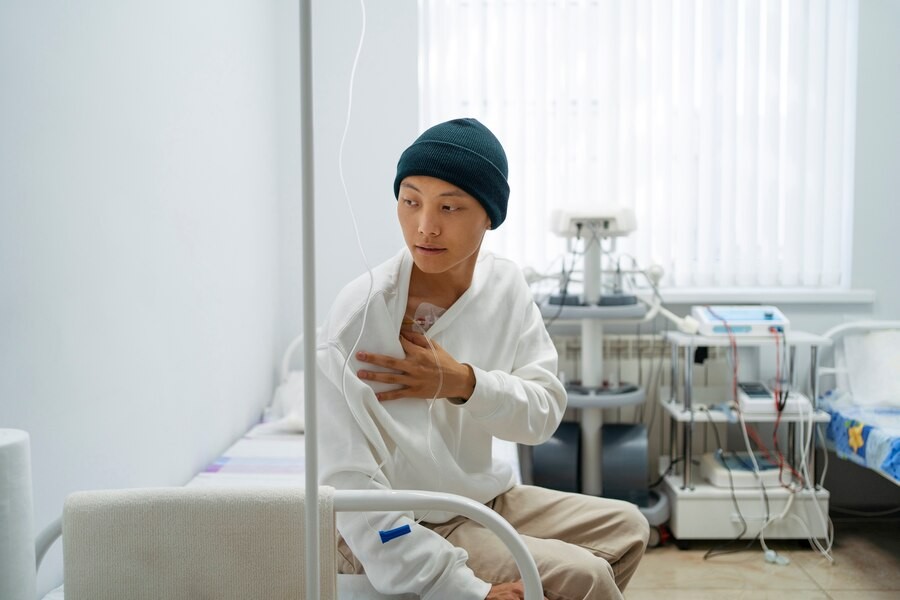Kemoterapi merupakan salah satu metode pengobatan yang umum digunakan dalam menangani berbagai jenis kanker. Pengobatan ini melibatkan penggunaan obat-obatan untuk membunuh atau menghambat pertumbuhan sel kanker yang berkembang sangat cepat.
Sebelum memulai pengobatan kemoterapi, dokter biasanya akan memberikan penjelasan mengenai manfaat, prosedur, biaya, dan efektivitas. Salah satu yang juga perlu Anda ketahui dari kemoterapi adalah berapa lama prosedur ini dibutuhkan.
Apa itu Kemoterapi?
Kemoterapi sering digunakan sebagai pengobatan utama yang dikombinasikan dengan metode lain untuk mengobati kanker. Kemoterapi bekerja dengan menyerang sel-sel kanker yang membelah dengan cepat dan tidak terkendali.
Ada kalanya, kemoterapi tidak hanya menyerang sel kanker, tetapi juga memengaruhi beberapa sel sehat yang memiliki laju pembelahan cepat, misalnya seperti sel di rambut, saluran pencernaan, dan sumsum tulang. Ini dapat mengakibatkan efek samping seperti rambut rontok, mual dan muntah, kelelahan, mudah memar, kehilangan nafsu makan, sariawan hingga diare atau sembelit.
Baca Juga: Selain Kerontokan Rambut, Ketahui Risiko dan Efek Samping Kemoterapi Lainnya
Berapa Lama Waktu yang Dibutuhkan untuk Kemoterapi?
Lama pengobatan kemoterapi biasanya berlangsung antara 3-6 bulan, namun ini bukanlah waktu yang pasti. Durasi pengobatan kemoterapi sangat bergantung pada banyak faktor seperti jenis kanker, stadium kanker, respons tubuh terhadap pengobatan, serta tujuan kemoterapi itu sendiri.
Kemoterapi biasanya tidak dilakukan dalam satu sesi panjang, melainkan dijadwalkan dalam siklus. Setiap siklus biasanya berlangsung selama 2-6 minggu dengan pembagian sebagai berikut:
- Siklus mingguan, di mana kemoterapi diberikan setiap minggu
- Siklus dua mingguan, di mana kemoterapi perlu dijalani setiap dua minggu sekali
- Siklus tiga atau empat mingguan, di mana kemoterapi diberikan setiap tiga atau empat minggu sekali
Setiap sesi kemoterapi bisa berlangsung antara 30 menit hingga beberapa jam, tergantung pada jenis obat dan cara pemberiannya. Jika kemoterapi diberikan melalui infus, prosesnya dapat memakan waktu lebih lama dibandingkan dengan obat yang diberikan dalam bentuk pil.
Dalam beberapa kasus, orang yang memiliki jenis kanker agresif dan sulit diobati membutuhkan pengobatan lebih dari 6 bulan. Setelah menyelesaikan satu rangkaian kemoterapi, dokter juga akan mengevaluasi hasilnya melalui berbagai tes, termasuk CT scan atau MRI guna melihat apakah tumor telah mengecil atau sudah hilang.
Berdasarkan tes dan pemeriksaan tersebut, dokter akan menentukan apakah Anda membutuhkan siklus kemoterapi tambahan atau bisa dihentikan.
Baca Juga: Ketahui Apa Saja Gejala Umum Kanker pada Anak
Seberapa Efektifkah Kemoterapi?
Efektivitas pengobatan kemoterapi sangat bervariasi, tergantung pada jenis kanker, stadium kanker, dan respons terhadap pengobatan. Kemoterapi mungkin tidak bisa efektif dalam beberapa kasus, dan tidak selalu menjamin kesembuhan total.
Beberapa jenis kanker bisa sangat responsif terhadap kemoterapi, seperti kanker testis dan limfoma Hodgkin. Namun, untuk beberapa jenis kanker, kemoterapi saja mungkin tidak cukup efektif dalam membunuh sel kanker. Dalam kasus seperti ini, dokter mungkin akan merekomendasikan tambahan pengobatan seperti imunoterapi atau radioterapi untuk meningkatkan hasil pengobatan.
Selain itu, pada kanker stadium awal (seperti stadium I atau II), kemoterapi juga cenderung lebih efektif karena kanker belum menyebar ke bagian tubuh lain. Apabila kanker telah mencapai stadium lanjut (stadium III atau stadium IV), yang menandakan kanker sudah menyebar ke organ atau jaringan lain, kemoterapi menjadi lebih sulit untuk menghilangkan semua sel kanker.
Untuk mengetahui lebih lanjut mengenai prosedur kemoterapi yang mungkin Anda butuhkan, sebaiknya berkonsultasi kembali dengan dokter Anda. Anda juga bisa memanfaatkan layanan konsultasi kesehatan di Ai Care dengan mengunduh aplikasinya melalui App Store atau Play Store.
Mau tahu informasi seputar penyakit lainya? Cek di sini, yah!
- dr Nadia Opmalina
Deanna Altomara (2024). Chemotherapy: How It Works and How You'll Feel. Available from: https://www.webmd.com/cancer/chemotherapy-what-to-expect
Cleveland Clinic (2022). Chemotherapy. Available from: https://my.clevelandclinic.org/health/treatments/16859-chemotherapy
National Cancer Institute (2022). Chemotherapy to Treat Cancer. Available from: https://www.cancer.gov/about-cancer/treatment/types/chemotherapy
Brian Krans (2021). Chemotherapy. Available from: https://www.healthline.com/health/chemotherapy
Cancer Research UK (2023). Your chemotherapy plan. Available from: https://www.cancerresearchuk.org/about-cancer/treatment/chemotherapy/planning/your-chemotherapy-plan
Charlotte Lillis (2023). Survival and chemotherapy success rates for various cancers. Available from: https://www.medicalnewstoday.com/articles/326031












